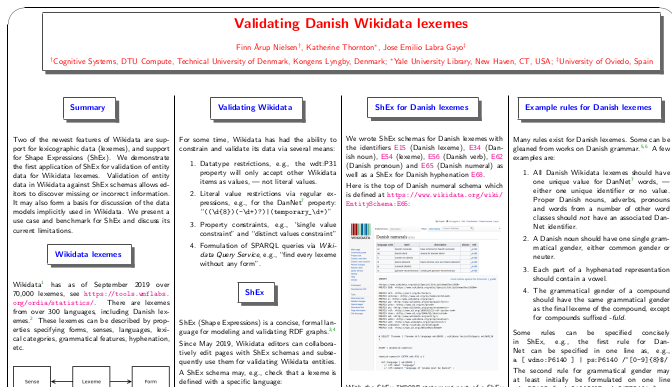Month: September 2019
SEMANTiCS 2019

SEMANTiCS (Scholia) is a conference in the artificial intelligence/Semantic Web domain. It is a combination of an industry and a research-oriented conference. Among Danish SEMANTiCS 2019 participants there was (I believe) a 5-2 overweight of non-academics compared to academics. The conference has so far been held at different locations in Europe. Next year a spin-off conference is to be held in Austin. In 2020, there will also be a conference in Amsterdam.
SEMANTiCS 2019 (Scholia) was held in Karlsruhe, – the birthplace of much of semantic wiki technology. If my notes are correct, then there were 88 submissions to the R&I track, 20 long papers and 8 short papers were excepted with an acceptance rate of 27%. With only two-days for the conference there is a considerable less research than at ESWC (Scholia). The invoice amount for my registration was €637.
The first day was allocated to workshops and I attended the 1st International Conference on the European Industry on Language Technology (ELSE-IF 2019). It was the smallest conference I have ever attended. We could fit around a table, I guess around 10 people participated. Luc Meertens presented work that has been prepared for the European Commission regarding European language technology. A large report is supposed to be published soon. The European language technology industry is relatively small and I sense that there is the fear that American (and perhaps Chinese?) bigtech may take part of the cake. As far as I remember the SDL company may be the largest European company. There are several European language technology research project. I made a short improvised demonstration of Wikidata lexemes and Ordia in the workshop.
On SEMANTiCS 2019, Michel Dumontier keynoted on FAIR (findable, accessible, interoperable, reusable) data principles. Valentina Presutti spoke on the issue of common knowledge in the Semantic Web pointing to ConceptNet, Tom Mitchell’s NELL, Atomic, The human know-how dataset, FrameNet and Framester.
Under the title Language-related Linked (Open) Data for Knowledge Solutions, Artificial Intelligence and more, Felix Sasaki from Cornelsen and Christian Lieske fra SAP presented information on linguistic linked open data and Wikidata. They have recently written an online article Wikidata gets wordier, that mentions and screenshots Ordia.
To my knowledge the articles were not published before the event, neither for the main conference, nor the workshops. However, our (Katherine Thornton (Scholia), Jose Emilio Labra Goya (Scholia) and I) SEMANTiCS poster paper Validating Danish Wikidata lexemes (Scholia) has been available for some time now. The minute madness slides and the poster are now also available. I have added a few of the other papers to Wikidata so they show up in Scholia’s page for SEMANTiCS 2019.
Update 19 September 2019: Preproceedings were in fact available. Thanks to Harshvardhan J. Pandit for making me aware of the link.